Enigmatic and majestic, sharks have fascinated humanity for centuries, captivating our imaginations with their sleek bodies and razor-sharp teeth. As symbols of the ocean’s undisputed power, whether sharks could thrive within the confined spaces of aquariums beckons marine enthusiasts and curious minds alike.
Content Table
In this exploration, we embark on a journey to unravel the intricacies of sharkfish, examining their unique characteristics, dietary habits, and the ethical considerations surrounding the idea of keeping these oceanic giants in captivity. Join us as we navigate the depths of knowledge to understand the possibilities and challenges of bringing sharks into the mesmerizing world of aquariums.

Are Sharks Mammals?
The short answer about sharks mammals is that they are not mammals. Sharks are a unique group of fish that have existed for more than 400 million years. They are members of the cartilaginous fish class including skates, rays, and sharks. Compared to other mammals that give birth to live offspring, Sharks don’t have such functionality. Rather, depending on the species, they either lay eggs or give birth to fully-grown Shark larvae.
They live in different aquatic settings, from the open ocean to the shallow sea shore. They are widely distributed, and through managing the populations of other marine species, they are essential to preserving the equilibrium of marine ecosystems. Sharks’ muscular tails, sleek bodies, and rows of pointed teeth make them ideal for their predatory lifestyle.
Shark Fish Diet & Eating Habits
Sharks are carnivores that eat a variety of meats. Depending on the species, size, and accessibility of prey in their environment, their feeding habits change. While some sharks seek aggressively for food, others are scavengers. Fish, seals, sea lions, squid, and even other sharks are common prey items.
Sharks’ extraordinary ability to feel the electrical fields produced by other living things, or electroreception, is one of their most amazing feeding habits. Because of this special adaptation, sharks are excellent carnivore fish who can find prey even in complete darkness.
Can Sharks Be Kept in Aquariums
Aquariums always capture the interest of people of all ages, providing a glimpse into the diverse and enigmatic world beneath the ocean’s surface. Several varieties of sharks are suitable for aquarium keeping.
Let’s investigate further, examining which sharks are most suited for aquariums and the things you should know about preserving them in captivity.
Suitable Sharks for Aquariums
Not all sharks are viable for aquarium living, because of their size, behavior, and environmental requirements. Rather than large, migratory animals, such as the Great White Shark or the Hammerhead, smaller species are more typically selected for display.
| Shark fish | Characteristic | |
| Blacktip Reef Shark | This shark species is tiny, reaching lengths of only about 5.5 feet. They are typically found in coral reef ecosystems and thrive in the confined confines of an aquarium. | 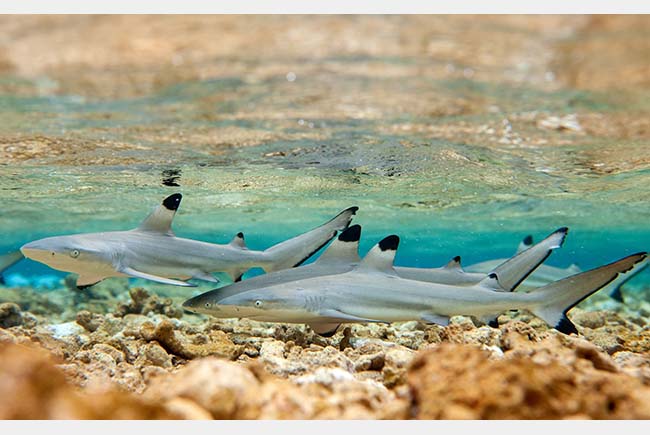 |
| Bamboo Sharks | Because of their modest size and ability to adapt to captive settings, these smaller bamboo sharks are ideal for aquariums. | 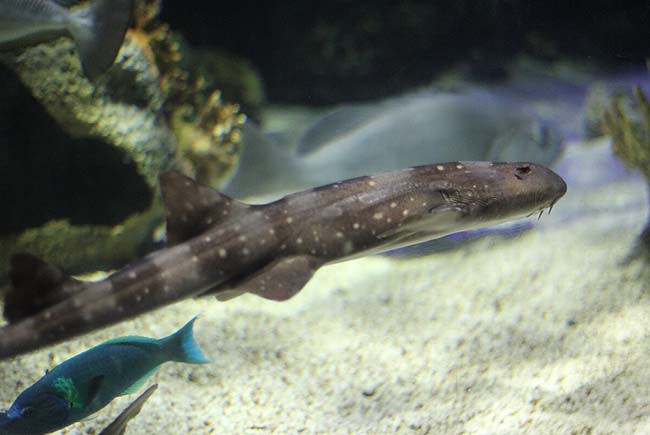 |
| Nurse Sharks | Nurse sharks are commonly kept in aquariums due to their calm and gentle temperament. Because of their usually calm demeanor, they are less prone to stress in cramped settings. | 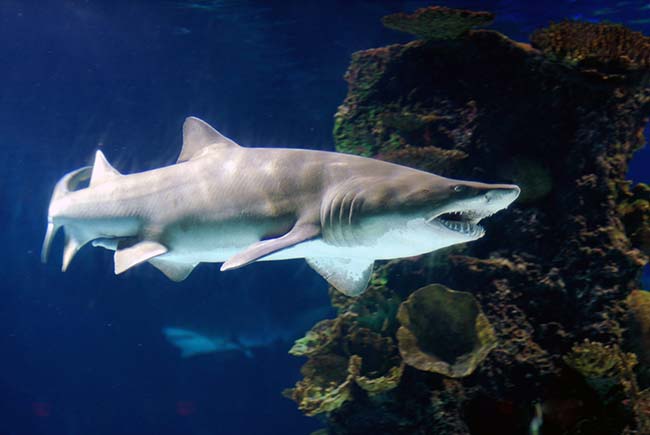 |
| Rainbow Shark | Rainbow sharks are popular selections for home aquariums because of their brilliant colors and modest size. They are well-known for getting along with a wide range of tank mates. |  |
| Siamese Shark | Siamese sharks, also known as Siamese algae eaters, are not actual sharks but are frequently featured in freshwater aquariums due to their ability to suppress algae growth. |  |
| Bala Shark | Bala sharks may adapt well to aquarium surroundings, because of their silver scales and torpedo-shaped bodies. | 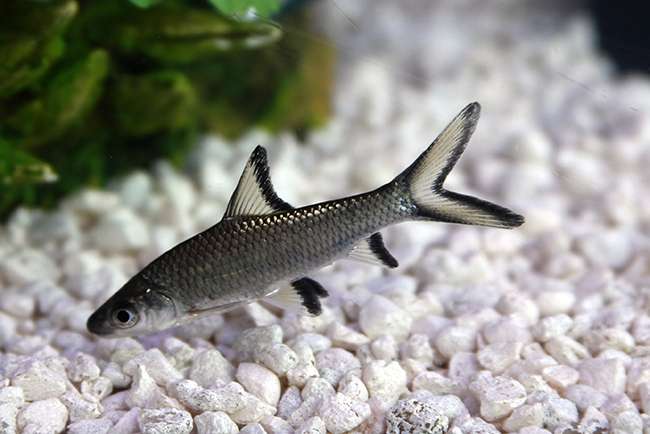 |
| Roseline Shark | The Roseline shark, also known as the Denison Barb, is a colorful and lively freshwater fish that is suitable for community aquariums. | 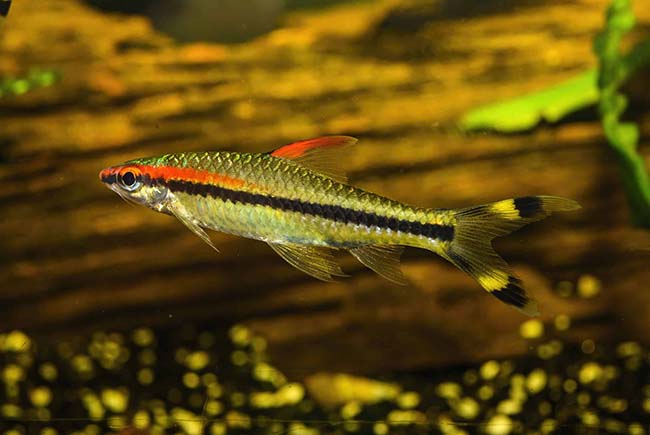 |
| Red Tail Shark | Known for its striking red tail, this species is a territorial freshwater sharkfish that can be kept in home tanks with appropriate planning to avoid violence. | 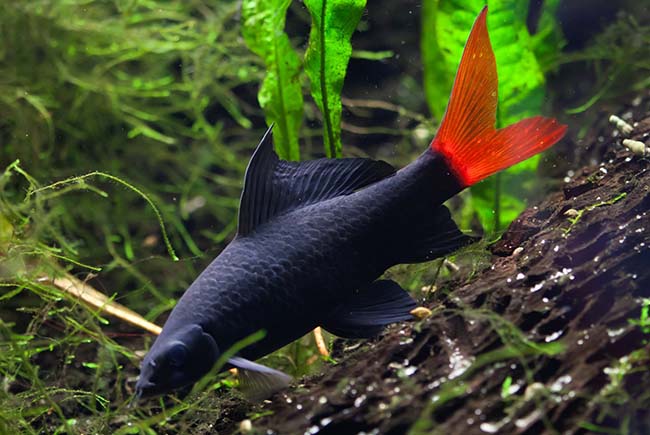 |
Aquarium Requirements for Sharks
Here are some key factors to keep in mind about aquarium shark requirements.
a.Tank Size: Sharks require a large tank to swim and investigate. Considering both length and depth, the tank size should be appropriate for the species being kept. Generally, more than 100 gallons of fish tank is the preliminary selection.
b.Water Quality: Shark health depends on maintaining appropriate water quality. To guarantee ideal conditions, regular water testing and filtration systems are required.
c.Enhancement of the Habitat: Diverse and exciting surroundings are beneficial to sharks. Features like ledges, caverns, and aquarium rocks promote natural behaviors and provide hiding places for them.
d.Salinity and Temperature: Sharks are extremely sensitive to variations in salinity and temperature. It is crucial to provide stable and suitable settings that resemble their native habitat. An aquarium hydrometer can do a big favor to test the salinity in the tank.
e.Compatibility: Aggression or territoriality towards other shark species may be displayed by certain shark species. Selecting compatible tank mates requires careful thought to avoid confrontations.
Feeding and Nutrition
A good diet is essential for the well-being of sharks in captivity. Understanding each species’ food requirements is critical. Some sharks are carnivores, but others may eat a variety of foods, such as crustaceans and tiny fish. Giving them a nutritionally balanced meal that suits their individual needs improves their overall health and vigor.
Regular Health Monitoring
It is critical to monitor the sharks’ health regularly to recognize any indicators of stress, disease, or nutritional deficiencies. This includes observing the fish’s behavior, inspecting for physical anomalies, and conferring with veterinary doctors familiar with aquatic life when needed.
Conservation and Ethical Considerations
Sharks in aquariums are attractive, but it’s important to approach this practice with ethical and conservation concerns in mind. Public awareness efforts, educational programs, and captive breeding programs can all help conserve shark species while promoting a better knowledge of these amazing species.
The Bottom Line
To sum up, the idea of preserving sharks in aquariums requires careful consideration between the wonder they arouse and the responsibilities that go along with it. Even though certain shark species are suited for confinement, it is crucial to carefully consider their demands.
Public awareness campaigns, conservation initiatives, and ethical concerns are essential for these amazing animals to live long and prosper. Let’s be cautious while considering the idea of presenting sharks in aquariums, honoring their natural habits, and making a positive impact on the preservation of these important marine animals.


Leave a comment